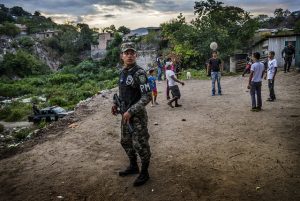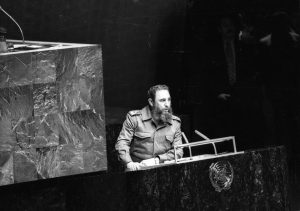
F&O’s Dispatches this week:
Security Chief: Europe Must Brace for New Extremist Attacks, by Alastair Macdonald
Islamic State will attack Europe again, security chiefs warned on Dec. 2, and may add car bombs, cyber and chemical warfare to its local arsenal as European militants drift home after reverses in Syria and Iraq.
Donald Trump’s Constitutional Problem, by Richard Tofel, ProPublica Report

Far from ending with U.S. President-elect Donald Trump’s announcement that he will separate himself from the management of his business empire, the constitutional debate about the meaning of the Emoluments Clause — and whether Trump will be violating it — is likely just beginning.
Porous Texas Fence Foreshadow’s Trump’s Wall Problems, by Jon Herskovitz
The rose-coloured border security fence starts in a dusty field on the Loop family farm in South Texas – about 15 miles inland from the Gulf of Mexico and a mile north of the southern U.S. border. From there, near Brownsville, it stretches about 60 miles west, but with plenty of gaps to drive or walk through. Where it exists, the fence doesn’t always stop illegal immigrants.
Is Your T-Shirt Clean of Slavery? Science Will Tell, by Liz Mermin Report
Shoppers lured by a bargain-priced T-shirt but concerned about whether the item is free of slave labour could soon have the answer – from DNA forensic technology.
Commentary:
Disappearing the Middle East, by Tom Regan Column
The Middle East has disappeared from American media, despite the billions the US has spent and continues to spend in the region. Americans have moved on. But here’s the rub — it won’t just go away.
Fidel Castro and the Defeat of South African’s Apartheid, by Jonathan Manthorpe Column
Many people questioned it then and continue to question it now, but Nelson Mandela had no doubt that Fidel Castro played a central and critical role in the defeat of apartheid in South Africa.
Castro and Trudeau, Kindred Spirits, by Jonathan Manthorpe Column
Canada’s Pierre Trudeau and Cuba’s Fidel Castro were brothers under the skin. It is no wonder they became life-long friends, for each could see a reflection of himself in the other. The similarity in the backgrounds of the two men is compelling.
Starve the Beast! by Jim McNiven Column
During America’s Ronald Reagan presidency, the phrase ‘starve the beast’ was shorthand amongst conservatives for the idea that by simply cutting back on expenditures — either through disciplined spending or by giving money away through tax cuts— people would be forced to accept smaller and less expensive government. It didn’t really work — but the idea persists, on the “left” and the “right.”
Necropolitics in Mexico and Central America, by By Ariadna Estévez, Expert Witness
There’s a standard narrative, that gang violence is forcing people to flee Central America and Mexico. But this overlooks two facts about the humanitarian crisis and regional tragedy, and criminal violence is just part of a dangerous cocktail.
To our supporters, thank you. Newcomers, welcome to reader-supported Facts and Opinions, employee-owned and ad-free. We will continue only if readers like you chip in, at least 27 cents, on an honour system. If you value our work, contribute below. Find details and more payment options here.
Notebook: on the death of Cuban revolutionary Fidel Castro

Before I first went to Cuba, in 1995 on a magazine assignment, a good friend who travelled widely on government business said it was the only Latin American country she knew where no children begged in the streets. I kept her comment in mind as I read up on the criticism of Cuba’s human rights and economic record.
At the airport at Holguin I encountered armed guards, enforcing Cuba’s then-rule against bringing in magazines, books or newspapers. Buildings everywhere were riddled with bullet holes, mementoes of the revolution. People were thin and food –mostly consisted rice and beans — was scant, following the collapse of its ally the U.S.S.R. Cuba’s air roiled with black oily exhaust belching from ancient vehicles; taking public transit required clambering into the back of a dump truck. Once in Santiago, a tour guide noted matter-of-factly that Cuba used firing squads for capital punishment.
But my friend was right: there was not a beggar to be seen. Children dressed in sparkling white walked to school in lines. Almost all of the adults I met had post-secondary education; my assigned driver had a PhD in anthropology and was married to a physician. Everyone had health care. Though Cubans were poor, no one I saw was downcast to the point of being broken; I still can’t say the same of other places I’ve been in the Americas — including the U.S.
Fidel Castro’s 1959 revolution has had mixed results, but as with most things in life, it’s not all good nor all bad. Cuba ranks 67th in the UN Human Development Index. Had Castro not revolted against the American corporate pirates who were then raping and ransacking the country, would it now rival perhaps Haiti (163), Nicaragua (125) or Honduras (131)?
My driver in 1995 said he hoped Cuba would change, open up to the world, allow him to travel. He was tired of being poor and hungry, he said. Then he frowned, and added, “But we have to be careful. We don’t want to lose what we’ve gained.”
Those gains — by a small, isolated and impoverished country — are revealed in an adult literacy rate of 99.8 %, and statistics that put the far wealthier United States to shame in areas like infant mortality (Cuba’s rate of 4, lower than 6 in the US); life expectancy (Cubans live to 79.1 years, Americans 78.8 years. Sources: UNICEF Cuba; UNICEF U.S. Such are the things I’ve kept in mind lately while listening to modern critics of Cuba’s human rights and economic record.
Our works about Cuba and Fidel Castro include two columns this week by International Affairs columnist Jonathan Manthorpe — Fidel Castro and the Defeat of South African’s Apartheid, and Castro and Trudeau, Kindred Spirits — adding to the earlier news: Fidel Castro, dead at 90. A Life in Photos; with Fidel Castro, Facts and Quotes, and an analysis by academic Mark Beeson, Fidel Castro: Anachronism, Achiever, With Tarnished Legacy.
Finding:
“Do you live in a bubble?” asks PBS. The American public broadcaster developed a 25-question quiz anyone can fill out to see how disconnected we might be from “from the average white American and American culture at large.” Adapted from one used by Charles Murray, a libertarian political scientist and author, it assesses how thick or thin the walls of a respondent’s bubble might be. It’s American, of course, but this Canadian guesstimated the local equivalent of US-specific questions. Find the quiz here.
~~~
Facts and Opinions is a boutique journal of reporting and analysis in words and images, without borders. Independent, non-partisan and employee-owned, F&O is funded by our readers. It is ad-free and spam-free, and does not solicit donations from partisan organizations. To continue we require a minimum payment of .27 for one story, or a sustaining donation. Details here; donate below. Thanks for your interest and support.
